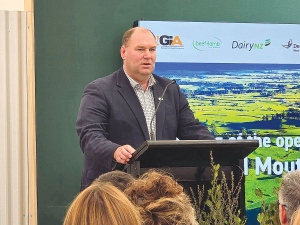DairyNZ Levy Vote Underway as Chair Highlights Seven-Fold Return
Voting has started for the renewal of DairyNZ's milksolids levy.
 Biosecurity Minister Andrew Hoggard says the agreement marks a major milestone in New Zealand’s readiness for a potential FMD outbreak.
Biosecurity Minister Andrew Hoggard says the agreement marks a major milestone in New Zealand’s readiness for a potential FMD outbreak.
Six industry organisations, including DairyNZ and the Dairy Companies Association (DCANZ) have signed an agreement with the Ministry for Primary Industries (MPI) to prepare the country for a potential foot and mouth outbreak.
The Foot and Mouth Disease Operational Agreement confirms how government and industry will jointly prepare for, and respond to, a possible outbreak - including how costs will be shared.
Under the deal, industry will contribute 40% of readiness costs and 15% of response costs - capped at $450 million. The dairy sector will contribute over 60% towards these costs.
Dairy farmers will meet 41.85% of costs and dairy processors 18.85%. Sheep and beef farmers will foot 20% of the costs with sheep and beef processors 16%.
Biosecurity Minister Andrew Hoggard says the agreement marks a major milestone in New Zealand's readiness for a potential FMD outbreak.
The deal takes effect from 1 July 2025 for five years.
"An outbreak could cost up to $3 billion to eradicate but doing nothing would be far worse; potentially slashing export values by $14.3 billion per year until it's controlled," says Hoggard.
"Through this agreement, we're locking in a truly collaborative approach. Industry will contribute 40% of readiness costs and 15% of response costs - capped at $450 million - and in return, they'll have a formal seat at the decision-making table."
Hoggard says the agreement reflects years of work and a shared commitment to protecting New Zealand's vital livestock sector.
"This is a significant and practical step forward for our national biosecurity system."
DairyNZ chief executive and inaugural chair of the Foot and Mouth Disease Council Campbell Parker welcomed the signing.
"Biosecurity is a key priority for DairyNZ as it helps us to power more productive and resilient farms - with dairy farmers the biggest sector investors in the biosecurity system," he says.
"Dealing with an outbreak of FMD would cost the livestock sector billions, and we want to be involbved in deciding how those costs would be best spent."
Dairy Companies Association of New Zealand executive director Kimberly Crewther says the agreement is a major milestone after over a decade of engagement to establish the foundations for partnership in addressing this most significant biosecurity risk for the livestock sectors.
"Recent overseas FMD outbreaks, including Europ, reinforce the importance of getting to this point and ensuring government and industries' combined resources, knowledge, and capability can be deployed in the most efficient and effective way to reduce risk and impacts."
The Crown's reference exposure is $2.5 billion million; however, its liability is uncapped, meaning it may spend more in the very unlikely event of multiple responses during the FMDOA's term.
The industry contributions are split between the different sectors based on their relative size in terms of value, with a further adjustment to account for any market access agreements that allow product to be traded, even if FMD is present in New Zealand.
Value is calculated on what different sectors add to the value of a product. The value of the farming sector is calculated on farm gate sales, and the value of processors is the difference between farm gate value and export value.
Controls on the movement of fruit and vegetables in the Auckland suburb of Mt Roskill have been lifted.
Fonterra farmer shareholders and unit holders are in line for another payment in April.
Farmers are being encouraged to take a closer look at the refrigerants running inside their on-farm systems, as international and domestic pressure continues to build on high global warming potential (GWP) 400-series refrigerants.
As expected, Fonterra has lifted its 2025-26 forecast farmgate milk price mid-point to $9.50/kgMS.
Bovonic says a return on investment study has found its automated mastitis detection technology, QuadSense, is delivering financial, labour, and animal-health benefits on New Zealand dairy farms worth an estimated $29,547 per season.
Pāmu has welcomed ten new apprentices into its 2026 intake, marking the second year of a scheme designed to equip the next generation of farmers with the skills, knowledge, and experience needed for a thriving career in agriculture.
OPINION: Staying with politics, with less than nine months to go before the general elections, there’s confusion in the Labour…
OPINION: Winston Peters' tirade against the free trade deal stitched with India may not be all political posturing by the…